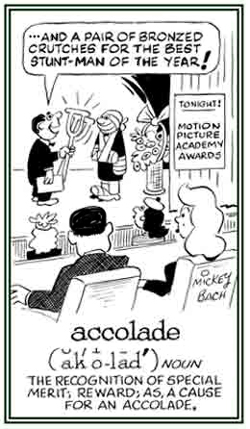-ade
(Latin: suffix; forming nouns and verbs; an action done; the product of or a result of some kind of material or a process of doing something)
2. A special acknowledgment; an award: Mack was very pleased with the accolade which he received at the university when he received the honorary degree.
3. A ceremonial bestowal of knighthood; a light touch on the shoulder with the flat side of the sword or formerly by an embrace, done during the ceremony of conferring knighthood: The squire knelt before the king and received an accolade, rising as a knight, Sir William Belt.
4. Etymology: from French, acolada from Vulgar Latin accollare, from Latin ad-, "to" plus collum, "neck".
The original sense is of an embrace around the neck or the tapping of a sword on the shoulders to confer knighthood; then the extended meaning became "praise, award".

Go to this Word A Day Revisited Index
so you can see more of Mickey Bach's cartoons.
2. Etymology: from Latin aqua- + -cade, from Latin cavalcade.
Literally, "a procession on horseback", in the twentieth century, -cade came to be regarded as a suffix and taken to form such words as, motorcade, aquacade, etc.
2. A series of arches supported by columns, piers, or pillars: The older couple decided to enhance their lovely garden with an arcade with climbing rosebushes growing up and over it.
3. A roofed passage way or lane: The arcade in town had shops on either side and was a nice attraction for its visitors.
4. A commercial establishment featuring rows of coin-operated games: Lynn's grandfather used to tell stories about his visits to the arcade in town where he could use his pocket money to play games.
On November 22, 1963 John F. Kennedy was assassinated in an autocade in Dallas, Texas, USA.
2. A unit or force in the army: A brigade is larger than a regiment or battalion, but it is smaller than a division.
3. A group of people who are dedicated to a particular thing or even share a certain characteristic: In school, Susi wanted to join the white blouse and white shoes brigade!
2. An attack of speech similar to artillery: There was a bombardment or cannonade of criticism which came from the members of the party when they heard the chancellor's decision.
2. A big amount of something that hangs down: Marge had a cascade of blond hair falling down her back.
3. Something that falls in a progressive manner or in aa series of fast steps: The decision of the government officials set off a cascade of negative responses by the general public.
Jason watched as the religious pilgrims climbed up the cascade of steps on their knees to the cathedral.
Helena's dark hair cascaded down her back all the way to her waist.
2. To move on to others through the years: The poverty of past generations of the country has cascaded down into the present offspring.The cavalcade of musical bands participated in a celebration of the New Year.
2. A holy war undertaken with papal sanction: Formally, a crusade was a religious war that was embarked on with the pope's encouragement and permission.
3. A strong movement for a cause or against an abuse: The town decided to organize a crusade against drunk driving.
The Crusades refers to the nine historical European-Christian military expeditions to the Muslim-controlled Holy Land. The term "crusaders" refers or those taking part in those campaigns.
In English, the term crusade has come to refer to any type of campaign that is conducted with an emphasis on zeal and persistence. Even in these days it may refer to a contemporary attack against Islam, whether perceived or real, asserted to be of similar nature or basis as the historic Crusades.
2. A group, set, or series of ten: Mrs. Smart divided her students into decades for the game, and since there were 30 students in her class, there were 3 decades altogether.
2. The slope of a roadway, either up or down: The speed limit was reduced on the freeway due to the steep decending grade of 15 %.
3. The performance on an exam or test which is expressed by a number or letter; a score: On the final examination in English, Jill received an "A" which was the best grade possible.
The grade that Susan got on her biology test was 95%, which was very good, but 100% would have been a perfect grade.
4. A certain level of quality, intensity, value, or rank: The carpenter suggested that Jill use the finest grade of sandpaper on the table to make it very smooth before painting it.
2. To organize in age levels: The books for children in the shop were graded according to the reading ability of the kids.
3. To smnooth, flatten, or level a large surface of something: Before the building process could begin, the ground had to be graded.
4. To score students' tests after correcting them: Mrs. Smart had so many tests to read throughly, marking the mistakes the students made, and then, after resting and eating something, she had to grade them fairly.

